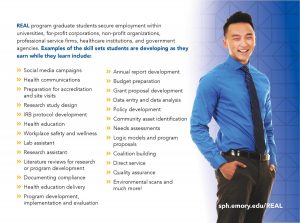Public Health Program Associate, PRISM
Category : Alumni
We are seeking a highly organized Public Health Program Associate to support the iTech project. iTech is a 5-year project housed within the PRISM Health research group in the Department of Epidemiology at the Rollins School of Public Health Emory University.
This project, currently in its fourth year, is a collaboration between Emory University and University of North Carolina. The UNC/Emory Center for Innovative Technology (iTech) aims to lower the burden of HIV infection by developing and evaluating innovative, interdisciplinary research on technology-based interventions (utilizing mobile apps) across the HIV prevention and care continuum for at-risk or infected youth aged 15-24 years in the United States.
This role will require overseeing study activities in an effective, detailed, organized and efficient manner. Responsibilities include but are not limited to participant recruitment, enrollment and retention, liaising with study partners, performing data analysis and representing studies during project meetings.
Under limited supervision, uses basic knowledge of public health principles to participate in recruitment activities of assigned studies, assist with the maintenance of the studies’ recruitment strategy and protocol.
Enter and manage participant data in various systems including participant set up, messaging, incentive payments, randomization and app account set-ups.
Oversee study retention using the SMART participant management system; develop and maintain study retention strategies through routine participant communication.
Contribute to the development and maintenance of study protocols, forms, questionnaires and documentation.
Work closely with the data management team to ensure accuracy and validity of data along with a smooth study flow; update weekly reports for team distribution.
Collaborate with outside organizations for more targeted recruitment efforts.
Attend recruitment related events, potentially outside of regular business hours and/or on weekends.
Attend all scheduled supervisory, department and study meetings.
Performs related responsibilities as required.
Minimum Qualifications:
A master’s degree in public health, a master’s of science degree in public health or health education, or a master’s in development practice from an accredited school.
Preferred Qualifications:
Communication/Teamwork
Excellent verbal and written communication skills demonstrated through contribution to a manuscript or report or draft thesis
Demonstrated ability to collaborate and interact with diverse team members
Demonstrated ability to work independently, completing tasks with minimal supervision
Demonstrated ability to multitask and to prioritize assignments so that project deliverables are completed on time
Other Knowledge, Skills, and Abilities
Strong organizational skills
Exceptional attention to detail
Critical and analytical thinking abilities
Prior Experience
Experience working in HIV/AIDS research or in HIV/AIDS prevention in community settings
Familiarity with communities of gay, bisexual, same gender loving, and other men who have sex with men
Experience in data management
Ability to communicate using various platforms such as text, email, social media, and phone
Ability to work independently with keen attention to detail and strong organizational skills
To apply, click HERE.











Recent Comments